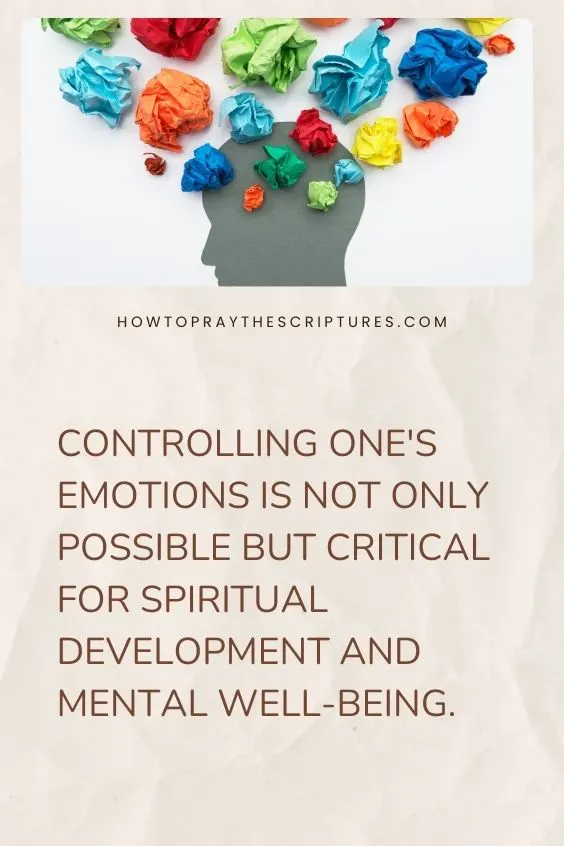The task of taming our emotions can be daunting. We’ve all felt emotionally out of control at some point or another, so it’s only natural to struggle with managing these feelings in a spiritual and healthy manner.
Thankfully, we can apply specific strategies infused with biblical principles to gain greater emotional control in a journey toward improved wellness and peace of mind! Whitney Hopler, an experienced writer on faith-based approaches for handling emotions, writes: “God created the unique person that you are—including your capacity for experiencing powerful emotions [..]. Emotions go far beyond the body, intricately interconnected to our spirit.”

How Can I Control My Emotions and Feelings Spiritually?
Controlling one’s emotions is not only possible but critical for spiritual development and mental well-being. This blog post takes us through actionable steps that are inspired by scripture and Christians can use in their quest for emotional healing! So, get ready, friends, as we explore ways to tackle uncomfortable emotions while staying true to God’s word!

How Can I Control My Emotions and Feelings Spiritually?
Understanding Emotions

How Can I Control My Emotions and Feelings Spiritually?
Beneath the surface of what we experience daily lies a deeper world of emotions that can be powerful and overwhelming. To control these feelings, it’s essential to understand how they affect us spiritually and learn methods for managing them in our daily lives.
Types of Emotional Pain
- Grief and sadness – A period of emotional pain is a natural response to loss or difficult transitions in life such as death, divorce, illness, betrayal, or major lifestyle changes. This type of emotional pain can cause feelings of anger, anxiety, and emptiness that can adversely affect spiritual growth if left unaddressed.
- Fear – Many individuals struggle with fear based on past traumas or perceived future dangers, and this can manifest as physical symptoms such as sweating or increased heart rate when faced with potential danger or crises. Addressing their spiritual fears helps them combat these emotions so they do not become overwhelmed during difficult times.
- Jealousy and envy – These intense emotions arise whenever someone desires what another individual has – be it an object, relationship status, or success – resulting in their feeling unworthy and inadequate in comparison with others’ accomplishments (real or perceived). Expressing gratitude for what one does have instead of magnifying lack can reinforce personal worthiness, leading to positive spiritual affirmations within an individual’s soulful core being.
- Guilt – Similar remorse-based pangs of conscience occur mainly due to internal conflicts between actions taken versus desired outcomes—a result of choices that are based on incomplete situational information, prior experience, learned beliefs, etc. For many people, understanding guilt becomes quite a challenge without any religious acknowledgment. It often requires proper guidance, support, and reflection on why we feel guilty regarding certain decisions.
How Emotions Impact Our Spiritual Growth
It is important to recognize that our emotional and spiritual lives are intertwined. Our emotions often affect how we perceive the world around us and our relationships with others.
When it comes to spirituality, controlling our emotions can have a considerable impact; if we let our feelings take over, they can create roadblocks on the path of spiritual growth.
Emotions such as grief, envy, and resentment can make finding peace or joy in life difficult. They also have the potential to cause significant disruption in relationships by distorting how we think about or respond to others.
Unchecked anger can lead us to sin against God’s Word or disrespect someone He loves dearly; unchecked sadness could prevent us from recognizing and receiving His promises and blessings. On the other hand, positive emotions such as gratitude and love help orient us toward trust in God—something that becomes easier when our emotional health is sound.

How Can I Control My Emotions and Feelings Spiritually?
The good news is several spiritual strategies are available to help manage emotion regulation! Making time for Scripture study will give us better knowledge of what God wants from his people and teach us ways in which we should use our negative feelings godly by making them work to bring us closer to God than ever before rather than any harmful human beings around us.

How Can I Control My Emotions and Feelings Spiritually?
Controlling Emotions Spiritually

How Can I Control My Emotions and Feelings Spiritually?
While emotions can often present obstacles in our spiritual journey, acknowledging and understanding them can provide us with powerful tools to foster emotional healing. From accessing the power of gratitude to engaging in prayer and meditation, uncovering healthy ways to manage our feelings through practical, spiritual exercises helps us move toward true contentment.
Gratitude
Practicing gratitude is an incredibly powerful tool for Christians to use in spiritually controlling their emotions and feelings. Gratitude centers us on God’s love and faithfulness as well as how, once again, we can make it through any emotional pain by clinging to Him with a sincere heart.
In addition, offering sincere thanks brings us closer to Him and helps to strengthen our relationship with the Holy Spirit even further. Embracing gratitude as part of regular spiritual practice can do wonders for one’s mental health as it aids in reducing stress levels, releasing fears or worries, increasing inner strength, and bringing about more positive emotions such as happiness, contentment, hope, better sleep patterns, and improved physical health, among other benefits.
The Bible also encourages offerings of praise from a place of joyous gratitude, e.g., Psalm 100:4–5 reminds us to “Enter His gates with thanksgiving and His courts with praise.”
Time Out for Reflection and Prayer
Prayer is an essential element of a spiritual life. Taking the time to pause and pray can help reset your mind and calm the emotions that often overwhelm you. Praying enables us to release our burdens and realign ourselves with God’s will.
- Acknowledge your emotions: Recognize and validate your emotions for what they are before you try to control them. It is important to realize why we get overwhelmed by our difficult feelings.
- Establish a prayer routine: One of the most effective ways to practice this is by establishing a designated time for reflection and prayer that fits into your daily schedule. This could involve spending some silent moments before you start your day or spending time alone at night right before going to bed—or both!
- Reach out to others: Find a trusted person who can listen attentively as you vent your frustrations and worries, whether through one-on-one conversations, joining an online support group, or using another professional outlet such as a counselor or therapist, depending on the complexity of your issue.
- Spend quality time in nature: Being around nature can be incredibly calming and restorative; it can help one gain perspective about their challenges and derive insights on how to approach them better. Going for walks while being mindful of how thankful we are for God’s blessings can also be another helpful way of reviving faith that is waning due to trials faced with painful emotions along the way. So, take some time to connect with nature!
- Choose prayers intentionally: When we feel a high degree of emotional strain, it helps to articulate specific prayers or mantras that encompass our heartfelt thoughts. An effective exercise might be writing down short prayers beforehand on index cards that read “I pray for peace” or something else that reflects how you feel. These serve as reminders during quiet meditational sessions of past moments of reflection dealing with hard emotions.
- Be open to spiritual counseling: When all else fails, seek spiritual mentorship such as consulting pastoral leaders for additional advice on how one can better cope spiritually with difficult situations arising from emotional issues. This can provide biblical guidance drawn from Jesus’ struggles here on earth, which were defined by sacrificial love.
Deal with Emotions Honestly
Regarding our spiritual journeys, it is important to learn how to deal with our emotions honestly. All too often, we internally repress our feelings and attempt to ignore them to avoid feeling overwhelmed or ashamed of what we may be experiencing. This kind of emotional repression can lead to long-term harm as unresolved pain accumulates over time. We must take the time and effort required to feel these emotions in a genuinely healthy, non-destructive manner.
The Bible instructs us to understand this matter. Paul says, “Be angry but do not sin” (Ephesians 4:26), instructing us to learn how to vent our frustrations without committing crimes or wrongdoing.

How Can I Control My Emotions and Feelings Spiritually?
Take Care of Physical Health
Having a healthy physical body is essential for emotional and spiritual well-being. Numerous studies have found that increasing physical activity directly contributes to improved mental health, overall health, and boosted self-esteem.
Emotionally healthy people are in control of their thoughts, feelings, and behaviors; this includes taking care of the body through exercise regardless of the level at which you can participate. Integrating physical well-being into our spiritual lives is as important as fueling our souls with religious devotions or prayer time. Being mindful about what we put into our bodies can help address issues such as poor self-esteem, low confidence levels, lack of self-control, worry about daily tasks, and challenges such as grieving or envying someone else’s accomplishments. These are all things that can plague us even while we pray or meditate on God’s word.
Learning Lessons from Emotions
When controlling our emotions and feelings spiritually, we must learn lessons from them. With the help of God’s Word and his Holy Spirit-filled guides, we can gain insight into what triggers an emotional response in us and why.
Awareness of these tendencies can help us identify destructive patterns or situations that may arise in the future so we don’t suffer emotionally. Moreover, by understanding our needs, moods, and motivations behind angry outbursts or other strong reactions, we can adjust our behavior accordingly when faced again with a similar situation.

How Can I Control My Emotions and Feelings Spiritually?
Proverbs 14:29 states, “Whoever is slow to anger has great understanding…,” reminding us that wisdom often transcends emotion. Knowing this enables us to gain valuable insights about ourselves, as well as those around us, simply by paying attention to how we feel rather than running away from difficulty or trying to distract ourselves from pain through temporary pleasures.
Conclusion
As Christians, we can control our emotions and grow spiritually through the power of God. We must submit our feelings to Him and trust that His will is better for us than ours. Gratitude is a powerful tool to help us focus on what we have instead of envying something someone else has.
Time-outs can be beneficial for calming down and reflecting in prayer; they allow us to be honest about how and why we feel a certain way. Also important is taking care of physical health so that mental health does not get too far out of balance.
Finally, being mindful of lessons learned in moments when emotions flare up also helps build spiritual growth; understanding mistakes made can deepen relationships by forming them based on love rather than anger or sadness. When we use these strategies to manage our emotions spiritually, we allow truth from God’s Word to shape them into obedience, faithfulness, joy, peace, and patience—the fruits of the Spirit. What a difference this makes at a soul level!
FAQs
1. How can I gain control of my emotions and feelings?
Achieving emotional well-being is important in maintaining spiritual balance, and one way to manage your feelings is through mindful meditation. This process helps you become aware of your thoughts and understand how they influence your daily decisions.
2. What are other ways to control emotions spiritually?
Exercising patience by pausing before reacting can help counter impulsive or instinctive responses that might otherwise be envious or destructive. Additionally, practicing gratitude for what you currently have instead of focusing on what’s missing creates an opportunity to redirect negative energy toward more positive outcomes.
3. Can I win battles with my spiritual enemies by controlling my emotions?
Sinful desires leave us vulnerable to attacks from our spiritual enemies. Still, by managing our emotions, we can limit their impact on our lives and avoid allowing fear or anger to take hold over reason and faith-based decision-making.
4. Are there any health benefits associated with learning to regulate my emotions spiritually?
Yes! Lower stress levels boost immunity, leading to healthier lifestyles overall; meanwhile, improved communication often leads to enhanced relationships and professional performance. These are both more easily achieved when regulation skills through prayer and self-discipline techniques have been mastered and are regularly practiced through a strong spiritual routine.